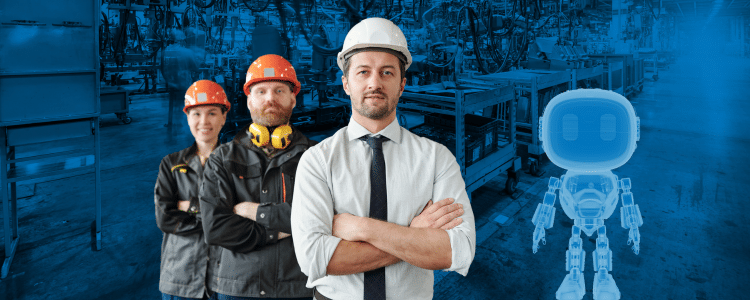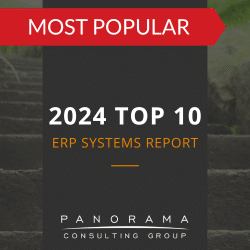Generative AI in manufacturing is starting to gain some real traction. Manufacturing firms are increasingly using this technology to predict demand, manage inventory, and ensure product quality.
Today, we’re delving into the role of generative AI in the manufacturing industry, exploring the benefits, risks, and use cases.
Understanding Generative AI in Manufacturing
Generative AI is a type of artificial intelligence that can generate new data, designs, and content based on its learning from extensive datasets.
For the manufacturing industry, this capability is transforming the way manufacturers design products, optimize processes, and approach the creative aspects of production.
For instance, generative AI can accelerate the design process, reducing the time it takes to move from concept to prototype. This not only cuts costs but allows manufacturers to experiment with more innovative designs without the fear of extensive financial or time losses.
Before You Dive In
The integration of generative AI into manufacturing processes is not without its challenges. It’s important to prepare for these challenges before diving into software selection.
In addition to the substantial data sets required to train the AI, you need vast computational resources and a deep investment in employee training.
You also need a dedicated focus on regulatory considerations, such as:
- Compliance with Safety Standards: Ensure that any AI-generated product designs or manufacturing processes meet industry-specific safety standards.
- Quality Assurance: AI systems involved in quality control must be designed to comply with quality assurance standards, ensuring that they can reliably identify defects and compliance issues.
- Data Protection and Privacy: In industries where manufacturing processes involve sensitive data, compliance with data protection regulations is essential. Manufacturers must ensure that their AI systems adhere to laws, especially when patient or consumer data is used to train AI models.
- Intellectual Property: When AI is used to generate new product designs, issues of intellectual property (IP) can arise. Manufacturers must navigate the complexities of IP law to determine ownership rights over AI-generated outputs and ensure their use of AI does not infringe on existing patents or copyrights.
- Environmental Regulations: While AI applications that optimize resource use and reduce waste can help companies adhere to environmental regulations, the deployment of such systems must be managed carefully to ensure compliance.
2024 Top 10 Manufacturing ERP Systems Report
Are you a mid- to large-sized manufacturing firm? This report is for you. Download it now to learn what kind of advanced functionality is available in the market today.
More Expert Tips for Generative AI Success
Using generative AI in manufacturing requires careful planning. If you work with ERP software consultants, they will likely recommend the following best practices:
1. Start With Clear Objectives
Define specific, measurable goals you aim to achieve with generative AI. Perhaps you want to reduce product development time, improve product quality, or optimize inventory levels. This clarity will guide your implementation strategy and help quantify success.
2. Ensure Data Quality and Availability
Generative AI systems rely heavily on data to learn and make predictions.
For simpler tasks, such as predicting standard equipment maintenance needs, datasets comprising thousands of machine operation hours might suffice.
However, for more complex applications, like designing new products or optimizing intricate production processes, the AI may need to learn from millions of data points that encompass a wide range of variables and conditions.
Do you have access to high-quality, relevant data sets? If not, you might need to enhance your data collection processes or partnerships to enrich your data resources.
3. Invest in Infrastructure and Talent
Successful AI implementation requires both the infrastructure to support machine learning algorithms and the skilled personnel to manage and interpret data insights.
High-performance computing power and advanced data storage solutions are critical for running advanced AI models. You must ensure your infrastructure can handle large volumes of data and complex computations.
In addition to technological infrastructure, human capital is equally important. Consider investing in training for existing employees to bridge any skills gaps.
4. Develop a Cross-Functional Implementation Team
Assemble a team with diverse expertise, including IT professionals, data scientists, engineers, and operational managers. This ensures the AI system is aligned with users’ needs and business objectives.
5. Prioritize Security and Privacy
Robust security measures are essential for protecting sensitive data used by generative AI systems.
Additionally, you should ensure compliance with relevant data protection regulations to maintain trust and integrity.
6. Monitor and Evaluate
Continuously monitor the performance of generative AI systems against your defined objectives. Use these insights to fine-tune models, adjust strategies, and improve outcomes.
Our independent ERP consultants ensure that clients continue to measure benefits realization for at least a year following go-live. This guides the client in refining its data inputs and improving data management practices as needed.
Practical Manufacturing Use Cases
Predictive Maintenance
For instance, in the automotive industry, generative AI can predict the wear and tear on production line robots, allowing for preemptive maintenance.
Product Design
Generative AI revolutionizes product design by suggesting design alternatives based on specified criteria, such as weight, material strength, and cost. This not only accelerates the design process but it fosters innovation.
For example, an aerospace company might utilize generative AI to redesign aircraft components, resulting in parts that are both lighter and more durable. This would not only improve fuel efficiency but create the potential for reduced material costs.
Quality Control
In electronics manufacturing, generative AI can detect microscopic defects in circuit boards before they lead to product failures, ensuring high-quality standards and customer satisfaction.
Inventory Management and Demand Prediction
This is particularly beneficial in industries like fashion, where demand can fluctuate rapidly with changing trends.
Customization at Scale
Generative AI allows manufacturers to offer customized products at a scale not feasible before.
For example, furniture manufacturers can use AI to design custom fittings that meet individual customer preferences and space requirements, all while maintaining production efficiency.
Supply Chain Optimization
AI can simulate and analyze entire supply chains, identifying bottlenecks and predicting future disruptions. This allows companies to adjust sourcing strategies and logistics operations dynamically.
For instance, a global food and beverage company might employ generative AI to optimize its supply chain from farm to table. By analyzing data from agricultural reports, weather forecasts, and consumer demand patterns, the AI can predict potential disruptions in food supply. Using this predictive capability, the company can proactively adjust its procurement strategies.
What’s Next for Your Manufacturing Company?
As the manufacturing industry continues to evolve, generative AI offers a promising avenue for innovation and efficiency.
However, it also presents a complex set of challenges that necessitate expert guidance. Our ERP consultants can help you define how AI might support your business goals. Contact us below for a free consultation.














